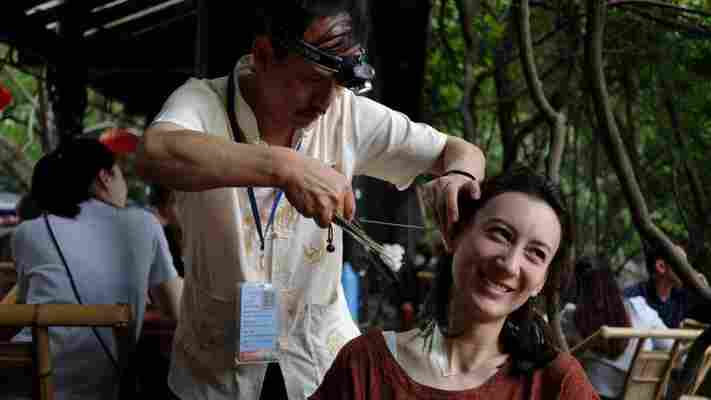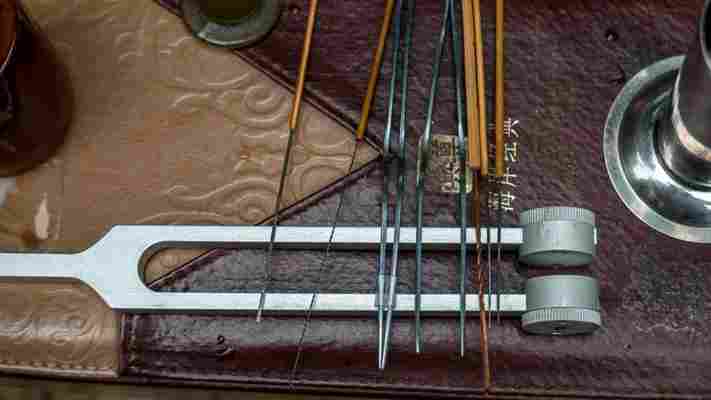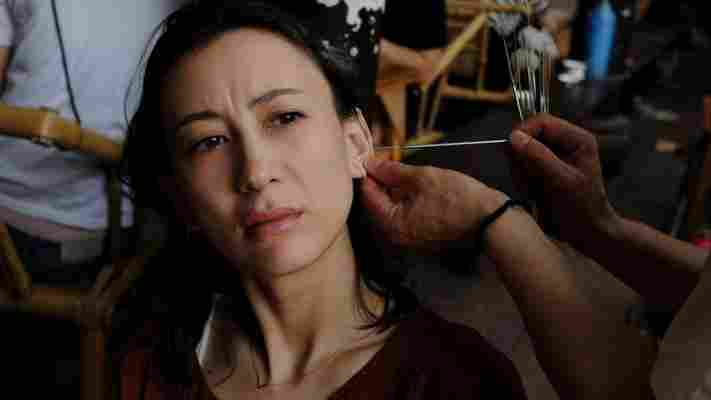Article continues below
A high-pitched sound rang out through the shady parks and bustling teahouses of Chengdu, capital of China’s south-western Sichuan province. It pinged and reverberated along the banks of the rivers and canals that wind lazily through the city, down narrow laneways lined with tile-roofed stone houses, and through the aisles of the opera house where masked performers twirl and sing their ancient routines every night. A clanging of some kind, announcing a snack vendor, perhaps? But as it came closer, the sound began to take on an unusual warble. Was it a knife sharpener? A band of piano tuners on the loose?
Finally, the source of the mysterious noise appeared: a long, two-pronged metal device that looked and sounded like a tuning fork. It was clutched in the hand of one of Chengdu’s roving ear cleaners, steady-handed specialists who wield myriad tools to flick, pick and twirl their customers’ ear canals clean.

In Chengdu, China, ear cleaning is a unique local tradition that is believed to date back many centuries (Credit: Carla Drago)
You may also be interested in: • Iran’s fascinating way to tell fortunes • China’s kingdom of women • The curious customs of Copacabana
These ear cleaners are a common sight on the streets of Chengdu, part of a unique local tradition that is believed to date back many centuries. According to cookbook author and Chinese food evangelist Fuchsia Dunlop, who wrote about her experience befriending an ear cleaner while studying in Chengdu in the mid-1990s, the practice dates to the Song dynasty (960-1279). To this day, these men – and less often, women – regularly patrol the city’s popular teahouses, such as the ones in the central People’s Park, and the well-touristed Wide and Narrow Alleys, a maze of reconstructed lanes and Qing dynasty-style buildings. Though they’ll occasionally set up temporary shop for a day with a few chairs, their work continues to be an outdoor, informal affair.
To understand why anyone would pay to have their ear canal probed in public, often before an audience of curious, camera-wielding onlookers, it’s necessary to understand general Chinese attitudes to ear hygiene. While cotton swabs are the norm in the West, in many parts of East Asia, it’s common to use ear scoops – a long, thin tool with one tip flattened into a little spoon – to tease out excess ear wax. My Chinese mother had a bamboo one when I was growing up, though I don’t remember her using it often on us kids.
Devotees might get it done about as frequently as getting their hair cut
The Chengdu practice, however, takes ear cleaning much further. Tao er (掏耳), or ‘ear scooping’, as it’s done here, is an elaborate, 20- to 30-minute ritual featuring an array of specialised tools. Devotees might get it done about as frequently as getting their hair cut. And for tourists, it’s a popular memento of a trip to Chengdu. According to a 2016 report from the China News Service , ear cleaners undergo extensive training to develop precision and steadiness before even touching an ear. One exercise has them using tweezers to pluck tiny threads out of a lit candlewick without extinguishing the flame.
In her memoir of 1990s life in Chengdu, Shark’s Fin and Sichuan Pepper: A Sweet-Sour Memoir of Eating in China , Dunlop described her first ear session as delivering ‘thrilling sensations’ and ‘shivers of pleasure’. With that kind of endorsement, how could I pass up my chance?

The ear cleaning process in Chengdu is an elaborate 20- to 30-minute ritual featuring an array of specialised tools (Credit: Zhang Peng/Getty Images)
A few afternoons after my arrival in the city, I was sipping a bowl of jasmine tea at the Heming teahouse in People’s Park when I heard the pinging of the ear man again. I beckoned him over, and swallowed my nervousness as Master Shu, as his name tag read, adjusted his headlamp and reached toward my ear with a skinny metal prong.
“Will it hurt?” I asked pointlessly. It was already too late to flee.
“Won’t hurt at all,” he murmured. The same thing my dentist always says before flicking on his drill of terror.
There was some twirling around the contours of the ear to begin with, then Master Shu went in for the kill. His probing around in the private recesses of my skull was surprisingly… tolerable. It felt like an awkward tickle, akin to having a sensitive spot on the sole of one’s foot teased very lightly: squirmy discomfort and weird pleasure combined. I tried my best to hold perfectly still – not an easy feat as Master Shu began to tut-tut his disapproval into my ear.
“Very dirty. Too dirty,” he admonished. “You need to do this more often.”

Hilda Hoy: “It felt like an awkward tickle, akin to having a sensitive spot on the sole of one’s foot teased very lightly” (Credit: Carla Drago)
Asians, he explained, have dry, flaky earwax that is easier to clean in comparison to Westerners’ sticky yellow stuff. And unfortunately for both me and him, I’ve apparently inherited earwax genes from my Irish-Scottish father. To prove his point, he chose that moment to present me with a sizeable gob that he’d just extracted. I’ll spare you the gory details.
Once he’d removed as much wax as possible, Master Shu switched to a feather-tipped tool, which went deep into my freshly scooped ear canal and made a few gentle twirls. For his finale, he whipped out that tuning fork-like instrument with a flourish, then touched its vibrating prongs against the feather tool, making it buzz against the nerves of my ear in the strangest way. He repeated the whole routine on the other side of my head, then dashed off to his next customer. Though I didn’t emerge with superhuman hearing, the experience was oddly satisfying – like having an out-of-reach itch scratched.
The experience was oddly satisfying – like having an out-of-reach itch scratched
Though vague claims circulate that the treatment improves health by stimulating acupressure points, there’s doesn’t seem to be evidence supporting this. “I'm all for people doing whatever it takes to feel relaxed and cared for,” said Claudia Huang, an anthropologist and doctoral candidate at the University of California, Los Angeles, who is currently conducting fieldwork among Sichuan’s aging populations. But according to her doctor mother, who trained at the Chengdu University of Traditional Chinese Medicine, “There is no medical system in the world that would advocate sticking foreign objects into the ear canal. People do it because they think it feels good.”
Many Chengdu residents believe that ear cleaning improves health by stimulating acupressure points in the ear (Credit: WANG ZHAO/Getty Images)
In fact, the most common adjective to describe the effects of the ear cleaning is shufu (舒服), a term that means comfortable, balanced, refreshed and relaxed, all rolled into one. It’s a telling clue in explaining how the ear cleaning ritual became a part of street life in Chengdu, a city infamous across China for its relaxed, laid-back lifestyle.
“Part of being in Chengdu is relinquishing yourself to the moment and letting the city’s vibe wash over you,” said Jordan Porter, a Canadian who has made Chengdu his home for the past eight years. He started his own company, Chengdu Food Tours , to help visitors discover the city’s epicurean side, sampling famously spicy local dishes like dan dan noodles, mapo tofu and pork dumplings bathed in chilli oil. “Ear cleaning allows that to happen. It’s an activity that is built into the culture of Chengdu.” To pause, sit back, and surrender to the experience – “Metaphorically, it’s like unbuckling one’s belt in public,” he added with a laugh.
Metaphorically, it’s like unbuckling one’s belt in public
Agriculturally abundant, the Chengdu region has long been a low-stress, live-and-let-live kind of place, with plentiful food and a pleasant climate, a place where culture and literature could thrive. Yang Xiong and Sima Xiangru, two preeminent poets of the Han dynasty (206 BC-220 AD), were both born here. Renowned classical poet Du Fu (712-770), often referred to as China’s ‘poet-sage’, chose Chengdu as the place to write a significant body of work in his 40s. “It was always this trading ground, with new ideas being brought in, which made it a very creative place but also mellow. They didn’t have to reach out, things came to them,” Porter said.
What developed was not only a kind of liberalism, but also an epicurean appreciation for the finer pleasures in life – from lingering at the teahouse for hours, sipping bottomless cups of tea and snacking on roasted watermelon seeds, to playing cards or mah-jong and treating oneself to a massage or ear cleaning. It’s this reputation that gave rise to a Chinese saying: The young shouldn’t go to Chengdu, and the old shouldn’t leave (少不入蜀,老不出川). The laid-back lifestyle would snuff out the drive of the young, the belief goes, while it’s the perfect setting for the old to live out their well-earned golden years.
According to Anita Lai, a born-and-raised Chengdu native, today’s young generation isn’t too keen on getting their ears done anyway. There is a stark generational gap in the ear cleaners’ clientele, she says, which is about half tourists – both domestic and international – and half locals, though only the older ones. “Many young people think it's a little scary and may be concerned about hygiene,” Lai said. The ear tools get only a basic cleaning at best. It’s for these reasons she’s never tried it herself, she confessed, though she is confident that “ear cleaning definitely still plays an important role in Chengdu's culture.”
Anita Lai: “Ear cleaning definitely still plays an important role in Chengdu's culture” (Credit: Hilda Hoy)
But if the young aren’t interested, will this tradition still be around for the coming generations? In the China News Service report, an ear cleaner named Chen Qiao worried for the future of his profession. Formal recognition and protection is necessary, he said. “We want to pass [the practice] down, protect it as a form of Chengdu’s culture – an intangible cultural heritage.”
But until that day comes, Chen and his legions of colleagues will carry on doing what they do best: sending their clientele into the blissful throes of relaxation, one ear at a time.
The Customs That Bind Us is a series from BBC Travel that celebrates cultures around the world through the exploration of their distinctive traditions.
Join more than three million BBC Travel fans by liking us on Facebook , or follow us on Twitter and Instagram .
If you liked this story, sign up for the weekly bbc.com features newsletter called "If You Only Read 6 Things This Week". A handpicked selection of stories from BBC Future, Earth, Culture, Capital and Travel, delivered to your inbox every Friday.
Leave a Comment